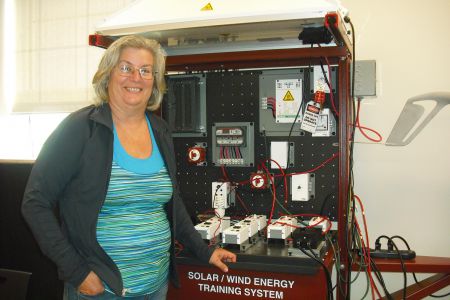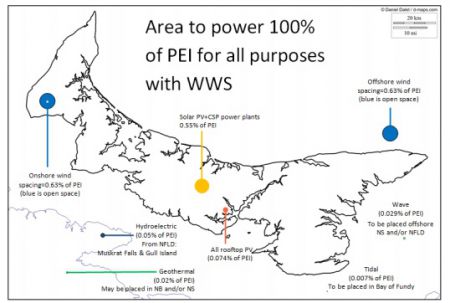They say it is the will of the people that changes the tides, and the tides on Prince Edward Island are changing, albeit slower than most people would like.
Recently, Renewable Energy PEI was formed to educate, promote and develop more renewable energy on PEI. It is a group of individuals and businesses who have an interest in seeing more renewable energy in the province; the best part is they are from a broad base of demographics and that tells a tale. A tale that just might see people powering the renewable energy revolution in the Maritime Region.
Darcie Lanthier, from Mermaid, PEI, sees the government's renewable energy policies in a different light than most, given her previous role as interim leader of the Green Party, a student in the renewable energy program at Holland College and as a homeowner looking to design her own net zero house.
Her biggest beef is with the removal of the tax break to homeowners purchasing renewable products.
Renewable products were exempt from the previous provincial sales tax, giving consumers a 10 per cent discount for purchasing renewable products. In April 2013, PEI joined the rest of the country and adopted Harmonized Sales Tax at 9 or 14 per cent more in taxes for previously exempt renewable products. Lanthier will tell you that “exempting oil from HST and applying it to renewable products – takes PEI in the opposite direction we should be going. Subsidizing furnace oil is a shortsighted policy.”
Next on her list of annoyances is the fact that government of the day years ago paid seniors to switch to electric heat and now charges HST on it. Lanthier strongly feels that policy should be made by the people, not those interested in being elected or by those who have a boss to deal with at the end of the day.
Asked what she would like to see in policy for Prince Edward Island in renewable energy Lanthier quickly rhymes off her wish list:
- Remove the HST on renewable energy products and water saving devices
- Give incentives to purchase electric cars.
- Have a feed-in-tariff for homeowners and businesses. Feed-in-tariffs compensate users for energy they provide to the electrical grid.
- Don't go ahead with the new $100-million plus cable to the mainland. The proposed new cable is to act as a replacement for two existing 36-year-old underwater cables that supply imported energy to PEI.
- Put Solar PV on all government buildings
- Review building codes to encourage a lighter carbon footprint through renewable energy. The existing building code isn't environmentally friendly.
- Remove the minimum size for housing
- Remove set-back requirements and allow south-facing houses to capture passive solar heat
- Allow grey-water and rain catchment systems
Jocelyn Plourde, a masters student at UPEI, studies renewable energy policy for his thesis. He says converting to renewable must start by implementing “changes to the power grid necessary to have a feed-in tariff (FIT) for individuals and businesses.”
“If you can allow people to make money from renewable energy, it will take off,” he says.
Plourde also suggests that low- or no-interest loans, the creation of co-ops, and private and public investment will allow people to invest in renewables and accelerate the process. Plourde believes that “the most efficient way to produce renewable energy is in a distributed way” – where thousands of plants power thousands of buildings.
“That's how Germany is able to produce so much solar – they want every house to produce electricity,” he says.
Asked over Facebook and in the first meeting of the Renewable Energy PEI group, homeowners say finances are the biggest barrier to implementing renewable energy in their home. Several mentioned more education is needed on what options are available to them, in terms of heat pumps, solar panels, and the variety of ways they can incorporate renewable energy into their homes. One person asked whether their municipality would allow them to have a small wind turbine.
From the financial point of view, electric companies in the region vary in their approach to paying customers for renewable energy power. PEI and NB both give a credit that expires if not used within a year, however, Nova Scotia has an enhanced system that actual pays cash in some cases to customers.
Government change in policy to allow homeowners who invest in the infrastructure to power their own homes with excess going to the grid would benefit greatly from a return on their investment from the power companies. So why aren't they willing to pay homeowners and businesses for energy rather than just giving credit? For PEI, it might just make the difference between an energy-poor province importing energy at higher rates and a more self-reliant energy Island.
There are two offices responsible for energy on PEI: the PEI Energy Corporation, whose role is the development of energy systems and the generation, production, transmission and distribution of energy; and the Office of Energy Efficiency, which focuses on energy efficiency and administering programs for individuals and businesses.
The PEI Energy Corporation list their challenges as follows: historically high electricity prices and balancing supply from renewable with electric demand and storage of renewable energy power. Government is not contemplating any changes to the Renewable Energy Act that regulates renewable energy in the province, meaning there are no changes to allow consumers/businesses to be paid for energy they provided to the grid.
Some movement is underway at the provincial level.
On Wednesday, September 25, EcoPEI made a presentation on a Positive Energy Policy for PEI to the Legislative Standing Committee on Agriculture, Environment, Energy and Forestry in the hopes to have government lead the way in policy to encourage more innovation from residences and businesses.
The PEI Energy Corporation is in the process of constructing a 10-unit wind turbine wind project at Hermanville/Clearspring that will provide 30 megawatts of electricity generation to the province, for a total percentage of electrical power coming from renewable energy sources to 30 per cent.
Other renewable energy projects include the PEI Department of Transportation & Infrastructure Renewal proceeding with an initiative to install biomass combustion units (wood burning) in public buildings across the province.
The Wind Energy Institute of Canada (WEICan), located at North Cape, Prince Edward Island recently commissioned a 10 MW wind farm. An important component to their project will be the use of industrial batteries to store wind power.
Matthew McCarville, a past research associate at UPEI, has drawn up a comprehensive plan to provide 100 per cent of the province's power from renewable energy obtained by wind, water, and sunlight.Other islanders involved in Renewable Energy PEI believe it can be done, and the Danish municipality Samsø Island is living proof. The island accomplished 100 per cent renewable energy in eight years and two months, with people, businesses, and government buying into the system.
The Office of Energy Efficiency is working to convince Islanders to make changes – unfortunately, the office has limited funds. Mike Proud, manager of the Office of Energy Efficiency confirmed that the 10 per cent rebate on renewable energy products has been exhausted for this year's funding with the majority of the money going to homeowners purchasing air-to-air heat pumps.
The HELP program offers a free weatherization program, which involves caulking and sealing houses, for low-income households. A supply of residential energy meters to lend to Islanders are both still available. There is also a grant program for MURBs (multi-unit residential building) and for commercial buildings to improve insulation and energy use based on a case-by-case basis.
Energy efficiency, and the need to change the mindset on energy usage, remains the biggest challenge. To this end, it would be good to have a policy on energy efficiency in the province, as suggested in the 2008 Energy PEI Report.
More people are becoming educated about the options and what needs to be done to promote renewable energy as a viable option for consumers and businesses in the region.
There is good news for those interested in seeing more renewable energy investment. Solar Island Electric Inc. has just announced they will operate as a Community Equity Development Business under the Community Development Equity Tax Credit Act of PEI. This will give individuals and businesses the opportunity to finance their solar electric systems over a period of time while also giving them the opportunity to invest in solar energy development in PEI.
The City of Summerside is leading the way in terms of building the infrastructure and knowledge to have renewable energy in their municipality. The municipality owns their own electric company and not only built their own wind turbine farm to generate electricity but are working on providing heating solutions to use the excess energy during off-peak times in the form of heating ceramic bricks.
In September, the city announced it has committed to installing 40 new electric car charging stations and hosted an electric car festival. The city is also looking at solar and waste water treatment options.
There are people in the region interested in moving from fossil fuels to renewable energy and it may take time to get there; however, people will power the change and it is the people who will benefit the most in a more secure energy future.
Definitions:
Feed-in tariff – money is paid for energy provided to the electrical grid by the owner of the utility.
Net metering – credit is given for future use by the energy provided to the electrical grid by the owner of the utility. Often at the end of a period of time it is erased if not used.
- Maritime Electric Net-Metering (PEI)
- NS Power Enhanced Net-Metering:
http://www.nspower.ca/en/home/environment/renewableenergy/enhanced/default.aspx
Groups:
Solar NS: http://www.solarns.ca/
Renewables NB: http://renewablesnb.ca/
PEI Renewable Energy: http://renewableenergypei.weebly.com/
PowerShift Atlantic: http://www.powershiftatlantic.com/
PEI Energy Commission Report: http://www.peiec.ca/consultation/
Solar Island Electric Inc. For more information contact Steve Howard, Office: (902) 436 9895 or steve@renewablelifestyles.ca




